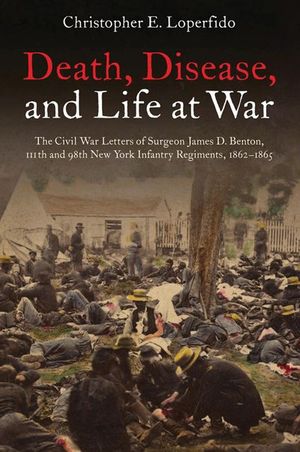Death, Disease, and Life at War
Published by Savas Beatie
A collection of letters from a Union surgeon in the American Civil War, revealing what life was like for a doctor and a soldier in that era.
Union surgeon James Dana Benton witnessed firsthand the suffering and death brought about by the ghastly wounds, infections, and diseases that wreaked havoc to both the Union and Confederate armies. A native of New York, Dr. Benton penned a series of letters throughout the war to his family relating his experiences with the 111th New York Infantry as an assistant surgeon, and later with the 98th New York as surgeon. This unique correspondence—which covers a wide array of topics beyond medicine and the treatment of the injured—is the basis of Death, Disease, and Life at War: The Civil War Letters of Surgeon James D. Benton, 111th and 98th New York Infantry Regiments, 1862-1865.
Dr. Benton was present for some of the war’s most gruesome and important battles, including Gettysburg, Cold Harbor, and the siege of Petersburg. He was also present for the fall of Harpers Ferry, Abraham Lincoln’s second Inaugural address, and the collapse of Richmond. His pen offers an insightful and honest look into the everyday life of not only a Union surgeon, but also an officer who suffered the same basic hardships other soldiers in the ranks endured. Chris Loperfido’s Death, Disease, and Life at War is a valuable addition to the Civil War bookshelf.
“More than 600,00 men perished in the Civil War, and many more were wounded or fell ill. Prompt and timely attention from an army surgeon was often the difference between life and death. James Benton’s letters home provide a compelling glimpse into the everyday life of these doctors—their concerns and frustrations, their patients and colleagues, the places visited, and their opinions on the war. I commend Christopher Loperfido for bringing this interesting slice of the war to light.” —Scott L. Mingus, Sr., award-winning author of Confederate General William “Extra Billy Smith”: From Virginia’s Statehouse to Gettysburg Scapegoat
“Loperfido’s excellent arrangement of [Benton’s] letters provide[s] a compelling look at the life of a Union doctor during a time when the practice of medicine was still primitive and an understanding of health in general was scanty at best. Death, Disease, and Life at War is another valuable piece to the puzzle of understanding what it was like to serve in the Civil War.” —Meg Groeling, author of The Aftermath of the Battle: The Burial of the Civil War Dead
Union surgeon James Dana Benton witnessed firsthand the suffering and death brought about by the ghastly wounds, infections, and diseases that wreaked havoc to both the Union and Confederate armies. A native of New York, Dr. Benton penned a series of letters throughout the war to his family relating his experiences with the 111th New York Infantry as an assistant surgeon, and later with the 98th New York as surgeon. This unique correspondence—which covers a wide array of topics beyond medicine and the treatment of the injured—is the basis of Death, Disease, and Life at War: The Civil War Letters of Surgeon James D. Benton, 111th and 98th New York Infantry Regiments, 1862-1865.
Dr. Benton was present for some of the war’s most gruesome and important battles, including Gettysburg, Cold Harbor, and the siege of Petersburg. He was also present for the fall of Harpers Ferry, Abraham Lincoln’s second Inaugural address, and the collapse of Richmond. His pen offers an insightful and honest look into the everyday life of not only a Union surgeon, but also an officer who suffered the same basic hardships other soldiers in the ranks endured. Chris Loperfido’s Death, Disease, and Life at War is a valuable addition to the Civil War bookshelf.
“More than 600,00 men perished in the Civil War, and many more were wounded or fell ill. Prompt and timely attention from an army surgeon was often the difference between life and death. James Benton’s letters home provide a compelling glimpse into the everyday life of these doctors—their concerns and frustrations, their patients and colleagues, the places visited, and their opinions on the war. I commend Christopher Loperfido for bringing this interesting slice of the war to light.” —Scott L. Mingus, Sr., award-winning author of Confederate General William “Extra Billy Smith”: From Virginia’s Statehouse to Gettysburg Scapegoat
“Loperfido’s excellent arrangement of [Benton’s] letters provide[s] a compelling look at the life of a Union doctor during a time when the practice of medicine was still primitive and an understanding of health in general was scanty at best. Death, Disease, and Life at War is another valuable piece to the puzzle of understanding what it was like to serve in the Civil War.” —Meg Groeling, author of The Aftermath of the Battle: The Burial of the Civil War Dead
BUY NOW FROM
COMMUNITY REVIEWS

